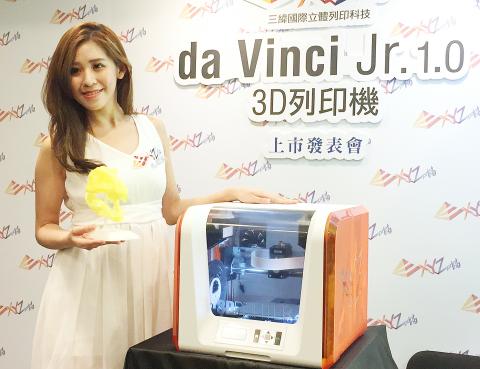Local 3D printer manufacturer XYZprinting Inc (三緯) yesterday launched its first entry-level model for students, hoping to see shipments quadruple to 120,000 units this year.
Last year, XYZprinting sold more than 30,000 3D printers, mostly for household use and designers, a company executive said.
With such growth, XYZprinting will turn a profit this year, chairman Simon Shen (沈軾榮) said on the sidelines of a news conference.

Photo: CNA
Broadening its product lineup, the company plans to roll out its first 3D food printer and a commercial model by the end of this year, Shen said.
“We are not worried at all [about growth]. We are seeing a continuous rising trend in demand,” Shen said.
MARKET OUTLOOK
Global shipments of 3D printers are expected to more than double to 217,350 units this year and expand to 2.3 million units in 2018, compared with 108,151 units last year, market researcher Gartner Inc projected.
“This year, the US will remain the biggest export destination for the company. We expect China to catch up with the US next year and to become a market as big as the US,” Shen said.
The market is expected to benefit from Beijing’s plans to equip each elementary school in China with a 3D printer.
“Beijing is encouraging young people to turn their design ideas into products,” Shen said.
LENOVO LINK
The three-year-old XYZprinting, a subsidiary of the New Kinpo Group (新金寶集團), is upbeat about the Chinese market, as the company has teamed up with Lenovo Group Ltd (聯想) to sell 3D printers there via China’s number one PC brand’s e-commerce subsidiary.
The company’s new model, dubbed the Da Vinci Jr 1.0, carries a price tag of NT$9,999 per unit and is XYZprinting’s first effort to bring 3D printing technology to the education sector.
In addition to the developed economies like the US, Europe and Japan, XYZprinting is expanding its reach markets including China, Iran, Turkey and Thailand.
To cope with its fast growth, XYZprinting has increased its workforce to more than 200 people, from 40 people since the company’s inception in 2013.

In Italy’s storied gold-making hubs, jewelers are reworking their designs to trim gold content as they race to blunt the effect of record prices and appeal to shoppers watching their budgets. Gold prices hit a record high on Thursday, surging near US$5,600 an ounce, more than double a year ago as geopolitical concerns and jitters over trade pushed investors toward the safe-haven asset. The rally is putting undue pressure on small artisans as they face mounting demands from customers, including international brands, to produce cheaper items, from signature pieces to wedding rings, according to interviews with four independent jewelers in Italy’s main

Japanese Prime Minister Sanae Takaichi has talked up the benefits of a weaker yen in a campaign speech, adopting a tone at odds with her finance ministry, which has refused to rule out any options to counter excessive foreign exchange volatility. Takaichi later softened her stance, saying she did not have a preference for the yen’s direction. “People say the weak yen is bad right now, but for export industries, it’s a major opportunity,” Takaichi said on Saturday at a rally for Liberal Democratic Party candidate Daishiro Yamagiwa in Kanagawa Prefecture ahead of a snap election on Sunday. “Whether it’s selling food or

CONCERNS: Tech companies investing in AI businesses that purchase their products have raised questions among investors that they are artificially propping up demand Nvidia Corp chief executive officer Jensen Huang (黃仁勳) on Saturday said that the company would be participating in OpenAI’s latest funding round, describing it as potentially “the largest investment we’ve ever made.” “We will invest a great deal of money,” Huang told reporters while visiting Taipei. “I believe in OpenAI. The work that they do is incredible. They’re one of the most consequential companies of our time.” Huang did not say exactly how much Nvidia might contribute, but described the investment as “huge.” “Let Sam announce how much he’s going to raise — it’s for him to decide,” Huang said, referring to OpenAI

The global server market is expected to grow 12.8 percent annually this year, with artificial intelligence (AI) servers projected to account for 16.5 percent, driven by continued investment in AI infrastructure by major cloud service providers (CSPs), market researcher TrendForce Corp (集邦科技) said yesterday. Global AI server shipments this year are expected to increase 28 percent year-on-year to more than 2.7 million units, driven by sustained demand from CSPs and government sovereign cloud projects, TrendForce analyst Frank Kung (龔明德) told the Taipei Times. Demand for GPU-based AI servers, including Nvidia Corp’s GB and Vera Rubin rack systems, is expected to remain high,